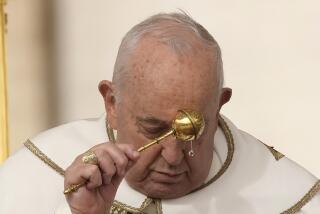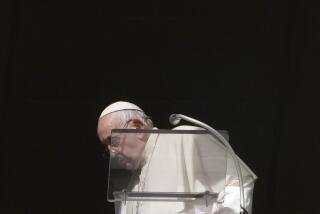Pope turns to Christian unity
- Share via
EFES, TURKEY — Invoking the name of a martyred priest, Pope Benedict XVI on Wednesday made a pointed plea on behalf of Turkey’s beleaguered Christian minority and celebrated Mass in an ancient shrine revered as the last home of the Virgin Mary.
Benedict ended his second day in Turkey with another solemn gesture of religious unity: He joined the spiritual leader of the world’s 250 million Eastern Orthodox Christians for prayer and blessings in Istanbul -- the former Constantinople, which once served as a seat of medieval Christian power.
For the record:
12:00 a.m. Dec. 2, 2006 For The Record
Los Angeles Times Saturday December 02, 2006 Home Edition Main News Part A Page 2 National Desk 1 inches; 35 words Type of Material: Correction
The pope in Turkey: An article in Thursday’s Section A about Pope Benedict XVI’s plea for Christian unity misidentified as Dutch the controversial newspaper cartoons satirizing the prophet Muhammad. They were originally published in Denmark.
The day saw the pope shifting his focus from Muslim reconciliation to Christian solidarity.
The Vatican on Wednesday also responded to a statement from Al Qaeda in Iraq denouncing the “crusader campaign” of the pope in Turkey as an affront to Islam. Spokesman Father Federico Lombardi said such threats were precisely the reason violence must be separated from religion, which he said was the core of the pope’s message. Lombardi added that the pope was not worried about the threat.
Security was already extremely tight for Benedict’s first visit to a Muslim country. In Istanbul on Wednesday evening, miles of streets were closed to protect the convoy, with police in riot gear posted along the route.
The pope had intended his Turkey pilgrimage to highlight Christian unity and the bridging of the 1,000-year-old rift between Catholics and the Orthodox, who do not recognize the authority of the pope. But comments he made in September critical of Islam enraged much of the Muslim world and forced him to change the agenda, using this visit to reach out to Muslims and attempt to repair the damage.
In that vein, Benedict reversed his opposition to Turkey’s attempt to join the European Union, among other gestures. But the EU bid suffered a setback Wednesday when the European Commission recommended that negotiations with Turkey be partially suspended because of continued dispute over the country’s dealings with EU member Cyprus.
Turkey has refused an EU demand to open its ports to Cyprus until the European bloc makes good on a promise to end the economic isolation of the Turkish-occupied part of the divided island nation.
Olli Rehn, EU enlargement commissioner, said in Brussels that Turkey’s aspirations to enter the organization were not dead but would move at a much slower pace.
Following on a day spent attempting to promote reconciliation with Turkey’s overwhelmingly Muslim majority, the pope Wednesday turned to “the little flock of Christ” living in the midst “of a great nation.” He traveled to southwestern Turkey, to the ruins of the ancient Greek city of Ephesus, known in Turkish as Efes, and to the squat stone house where some Christians believe the Virgin Mary lived out her final days. Parts of the foundation date to the 1st century, and legend has it that St. John brought her here from Jerusalem after Jesus’ crucifixion.
Mary is revered by Muslims as well as Christians. The Koran mentions the mother of Jesus numerous times, and the shrine here, at the end of a winding road, attracts pilgrims from both faiths. Benedict stressed that common bond Wednesday.
Standing on a stone altar festooned with carnations, a few yards from Mary’s purported house and enveloped in towering pines, Benedict celebrated Mass for several hundred Christians and others who managed to brave a battery of metal detectors and security gauntlets. It may have been one of the smallest public audiences ever seen on a papal trip, and was largely imported, at that. There were Turkish Christians but also many who had arrived from Spain, Italy and other parts of Europe.
It was an unusually intimate celebration. No one was farther than a few dozen yards from the pope, close enough to see his eyes.
Benedict offered his “personal love and spiritual closeness” and “a word of encouragement” to Christians in Turkey, “a small minority which faces many challenges and difficulties daily.”
“Let us sing joyfully, even when we are tested by difficulties and dangers, as we have learned from the fine witness given by the Roman priest Don Andrea Santoro, whom I am pleased to recall in this celebration,” the pope said.
Santoro was shot to death in February as he knelt in prayer at his church in the Turkish city of Trabzon. He was attacked amid the furor over Dutch newspaper cartoons that had satirized the prophet Muhammad.
Aishe Urturk, a fireplug of a woman in a tweed coat, pushed her way to the front of the crowd to catch a glimpse of the pope. “I love all the Christians,” the 70-year-old Muslim said.
Several in the audience gave the pope high marks for his efforts to soothe Muslim anger.
“He prayed here for peace and happiness for all mankind,” said Konstantinos Cedolini, a 39-year-old Turkish businessman and Roman Catholic. “He never mentioned a single word against Turkey. His speech was proof of his respect to all the Muslim world.”
Later Wednesday, the pope flew to Istanbul where he joined the Ecumenical Patriarch Bartholomew I for a prayer service inside the Cathedral of St. George, headquarters of Greek Orthodox worship. The two religious leaders, in flowing robes and sparkling capes, followed a procession of priests who held long candles the color of honey and sent wafts of smoky incense into the air.
The city called Constantinople was the capital of the Byzantine Empire for nearly a millennium, and the center of eastern Christianity. Turkey today is a country of about 70 million Muslims. Christians are dwindling in number, to perhaps 100,000, and those that remain complain of harassment and discrimination.
Among the problems they suffer are severe restrictions on their ability to buy and sell property and run schools to train their clergy. Most Christians are also ethnic communities, people of Greek or Armenian heritage and viewed by some Turks as “foreigners” who cannot be trusted.
The EU has consistently pushed Turkey to strengthen freedoms for religious minorities. But on Wednesday, at about the same time the EU was slowing talks with Turkey, Turkish President Ahmet Necdet Sezer vetoed a law required by the EU that would have enhanced property rights for non-Muslims.
The dilemma for Benedict is that as he offers support for Christians he risks again offending the Muslims he is seeking to engage.
*
More to Read
Sign up for Essential California
The most important California stories and recommendations in your inbox every morning.
You may occasionally receive promotional content from the Los Angeles Times.











